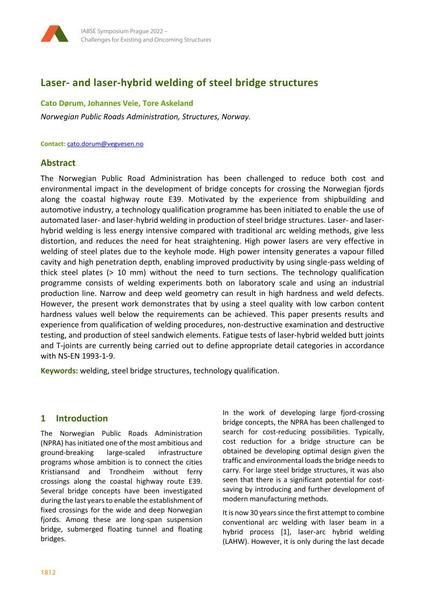Laser- and laser-hybrid welding of steel bridge structures

|
|
|||||||||||
Détails bibliographiques
| Auteur(s): |
Cato Dørum
(Norwegian Public Roads Administration, Structures, Norway.)
Johannes Veie (Norwegian Public Roads Administration, Structures, Norway.) Tore Askeland (Norwegian Public Roads Administration, Structures, Norway.) |
||||
|---|---|---|---|---|---|
| Médium: | papier de conférence | ||||
| Langue(s): | anglais | ||||
| Conférence: | IABSE Symposium: Challenges for Existing and Oncoming Structures, Prague, Czech Republic, 25-27 May 2022 | ||||
| Publié dans: | IABSE Symposium Prague 2022 | ||||
|
|||||
| Page(s): | 1812-1819 | ||||
| Nombre total de pages (du PDF): | 8 | ||||
| DOI: | 10.2749/prague.2022.1812 | ||||
| Abstrait: |
The Norwegian Public Road Administration has been challenged to reduce both cost and environmental impact in the development of bridge concepts for crossing the Norwegian fjords along the coastal highway route E39. Motivated by the experience from shipbuilding and automotive industry, a technology qualification programme has been initiated to enable the use of automated laser- and laser-hybrid welding in production of steel bridge structures. Laser- and laser- hybrid welding is less energy intensive compared with traditional arc welding methods, give less distortion, and reduces the need for heat straightening. High power lasers are very effective in welding of steel plates due to the keyhole mode. High power intensity generates a vapour filled cavity and high penetration depth, enabling improved productivity by using single-pass welding of thick steel plates (> 10 mm) without the need to turn sections. The technology qualification programme consists of welding experiments both on laboratory scale and using an industrial production line. Narrow and deep weld geometry can result in high hardness and weld defects. However, the present work demonstrates that by using a steel quality with low carbon content hardness values well below the requirements can be achieved. This paper presents results and experience from qualification of welding procedures, non-destructive examination and destructive testing, and production of steel sandwich elements. Fatigue tests of laser-hybrid welded butt joints and T-joints are currently being carried out to define appropriate detail categories in accordance with NS-EN 1993-1-9. |
||||
| Copyright: | © 2022 International Association for Bridge and Structural Engineering (IABSE) | ||||
| License: | Cette oeuvre ne peut être utilisée sans la permission de l'auteur ou détenteur des droits. |
||||

